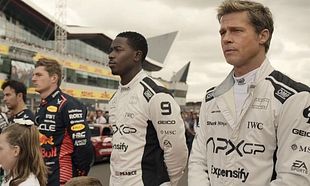Opening on the sight of a roaring, cascading dam in China, before cutting to an arid, barren former riverbed in Mexico, Watermark tells the story of mankind’s relationship with water, and how each side of that relationship has affected the other over the years since technology has become advanced enough to influence it.
Using the vague framing of a group of photographers as they travel the world to find the perfect pictures for their book on the subject, directors Jennifer Baichwal and Edward Burtynsky hit every corner of the planet, digging up some once-in-a-lifetime visuals which swing from awe-inspiring beauty to troublesome warnings.
Even with the photography element somewhat pinning down the story, there’s actually no real consistency to the storytelling here, with no real sense of structure behind it all. One minute we’re in a toxic leather tanning factory in Asia, the next we’re in the centre of the fountain display at the Bellagio hotel in Las Vegas, and then we’re on to the next random thing.
While there are some elements of the movie that most audiences would never have been exposed to before – the mass bathing event in the Ganges which brings over 30 million people in just one day, or the innards of a massive hydroelectric facility which will be six times the size and power of the Hoover Dam – there’s also an awful lot here which just seems to appear for the sake of it, like a visit to a surfing championship, or a man-made coastal resort in inland America.
With a limited amount of talking heads or interviews, what little of those we’re given involve names but no introductions, so we’re left alone to work out who these people actually are. Thankfully those images continue to shine through, with the epic, sci-fi landscapes mixed with constantly dazzling aerial shots of some truly spectacular sights.
Oddly enough, or perhaps serendipitously, those visuals often work better as stills, and Watermark does a better job of selling the photographer’s book project than it does at selling itself as an insightful or particularly interesting documentary.












































































